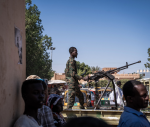You are here
Strengthening national identity
Apr 04,2024 - Last updated at Apr 04,2024
Jordan takes pride in the fact that all segments of its society contribute significantly to nation-building and shaping future policies. The diversity within the Jordanian society is not merely a demographic fact, rather a rich tapestry of perspectives and experiences that enrich the nation’s collective wisdom and strengthen its resilience.
For the purpose of this article I will reiterate insights shared by both the historian Hind Abu Al Shaer, and the late Ali Fazza, previous personal adviser to His Majesty King Abdullah.
Since the beginning of the Great Arab Revolt, the philosophy of governance among the Hashemites has been based on the principle of citizenship, which is synonymous with achieving justice and equality among all members of the people, regardless of colour, race, religion, gender, convictions or any other considerations. Its thinkers and advocates represented the entire intellectual and regional spectra. Notably, Christians had a prominent role in both the revolution, and later the state building. Therefore, Jordanians reject the term “minority” when referring to Arab Christians, since the Jordanian constitution guarantees their rights. What distinguishes contemporary Jordanian society is that its social ties have a distinct character, as the origins of these ties stem from deep historical roots that formed a unity of cultural composition, which contributed to strengthening the feeling of collectiveness and solidarity.
The issue of Jordanian national identity goes deep into history, going back to the period when Muslim armies consolidated the land of the Levant, where Christians had lived for centuries, and the period of the Great Arab Revolt, when its leaders and defenders represented the diversity of the religious and intellectual spectrum. It is known that Christians in particular had a prominent role in paving the way for the revolution, and in building the Jordanian state later. In return, the wise Hashemite leadership have always showed great respect for the role of Christian citizens. The first day of the founding of Transjordan, history proves that many of the nation’s free people gathered around the founder, King Abdullah I, and under his leadership, including Muslim, Christians, Druze, Lebanese, Iraqis, Hejazis, Circassians, Chechens and others. The Islamic and Christian diversity, stands as an important element of societal cultural composition, along with other important components that constitute the largest aspect of the cultural, psychological and social structure of any society.
In this era where the world blends with its various cultures and diversities, enhancing national identity is of utmost importance to ensure the stability and unity of societies. A set of general cultural characteristics, including values, customs and traditions, and even hopes and challenges, are similar among members of a single society, which works to enhance cohesion and unify ranks in the face of common challenges.
Solidifying national identity is an integral part of Jordan’s historical and cultural journey, as we find ourselves facing a society characterised by cultural and religious diversity, yet simultaneously united in its path of development and progress.
The Jordanian national identity is the honorable image of Jordan that His Majesty King Abdullah is making great efforts to convey to the world.
Journalist and writer specialised in interfaith dialogue, peace and reconciliation













Add new comment